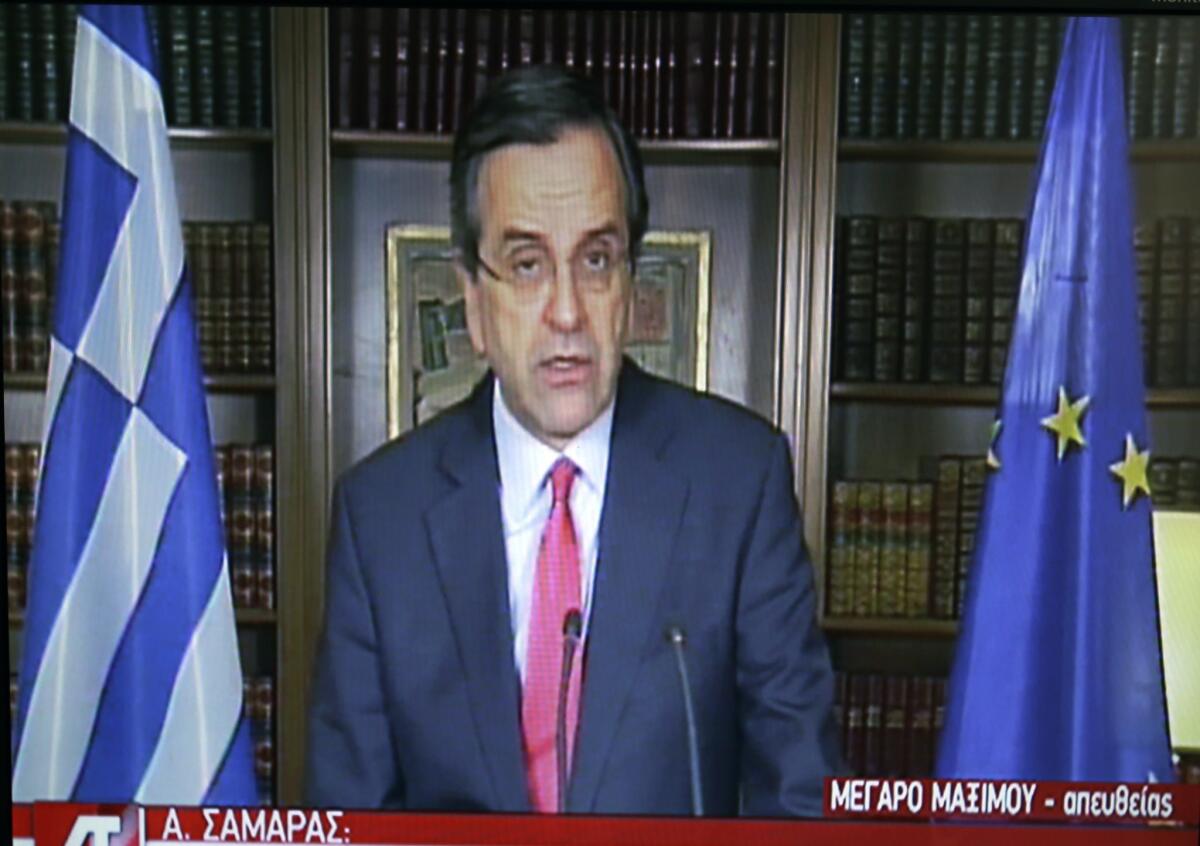Greece makes promising return to bond market

- Share via
ATHENS -- After four years of exile from global markets, Greece made a promising return Thursday by attracting strong demand at its first sale of government bonds since accepting two international bailouts to stay afloat.
A highly anticipated auction raised about $4 billion as international investors snapped up bonds that two years ago would have been deemed too risky. The amount was $500 million higher than Athens’ original target.
“The reception of the five-year bond has exceeded all expectations,” a beaming Prime Minister Antonis Samaras said in a nationally televised statement. “International markets have expressed, beyond any possible doubt, their confidence in the Greek economy. We did it.”
The bond sale represents a significant turnaround for Greece, Europe’s least creditworthy nation, whose deficit crisis 4 1/2 years ago sparked a run of international bailouts for Eurozone countries and fanned fears of a breakup of the entire euro currency union.
But many Greeks are still angry over the misery caused by the punishing austerity cuts Athens has implemented to reduce its deficit and meet the demands of its two bailout packages. Right before Thursday’s bond auction was to begin, a powerful car bomb exploded across from the country’s central bank headquarters, reverberating across Athens and causing damage but no injuries.
Government spokesman Simos Kedikoglou condemned the attack, saying homegrown extremists wanted to spoil Greece’s much-vaunted return to international bond markets.
“We will not allow this significant event to be trumped by terrorism and its agenda of violence,” Kedikoglou said.
The foray into the market and the bombing came a day before a planned visit by German Chancellor Angela Merkel, whom many Greeks blame for pushing their country into austerity and depression. The Greek economy has lost about a quarter of its value since the Mediterranean nation’s financial crisis erupted in 2009, and one in four workers is unemployed.
No group immediately claimed responsibility for the blast. About an hour before the booby-trapped car blew up, an unidentified caller contacted two local media outlets with forewarning of the explosion, police said.
Afterward, video images showed forensics experts and counter-terrorism authorities scouring the cordoned-off blast site for clues. Nearby storefronts were gutted, and shards of glass lay scattered on the street.
Local media reported that the car contained about 150 pounds of explosives.
The government’s decision to once again raise money in the commercial market was hailed as a positive step, even if the amount in question is relatively low.
“The time is ripe, but the move is largely symbolic,” said Gikas Hardouvelis, chief analyst of the Athens-based Eurobank. “It’s all about sending out a strong signal, that Greece has turned the corner and that it remains well-anchored in the disciplinary device guiding the euro. For markets, which are a vicious force, that matters.”
Bankers and state officials said the auction was oversubscribed, receiving about $23.6 billion in bids for the bonds through seven international credit institutions handling the sale. The officials suggested that the size of the sale could increase depending on demand for the issue.
But public anger remains high over the price that Greece has had to pay to right its finances, and Athens’ debt burden continues to rise. Currently at 175% of gross domestic product, it could hit 190%, a report by Citigroup warned.
With local and European parliamentary elections nearing, opposition parties criticized the bond issue. The radical leftist Syriza party called it a campaign trick and accused Samaras of acting rashly.
“Going out to markets is one thing,” the Democratic Left party said in a statement. “Exiting the crisis is another.”
Carassava is a special correspondent.
More to Read
Sign up for Essential California
The most important California stories and recommendations in your inbox every morning.
You may occasionally receive promotional content from the Los Angeles Times.













